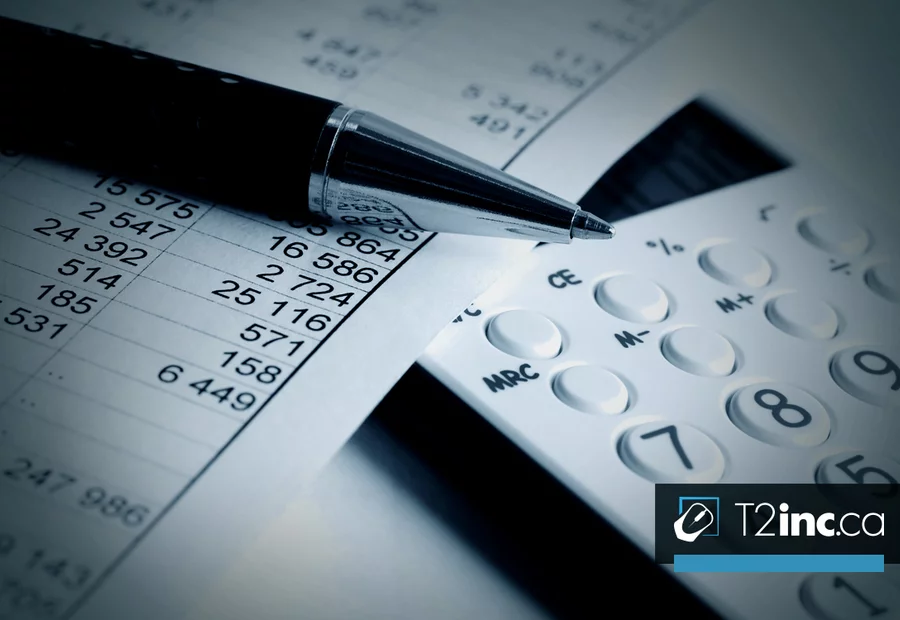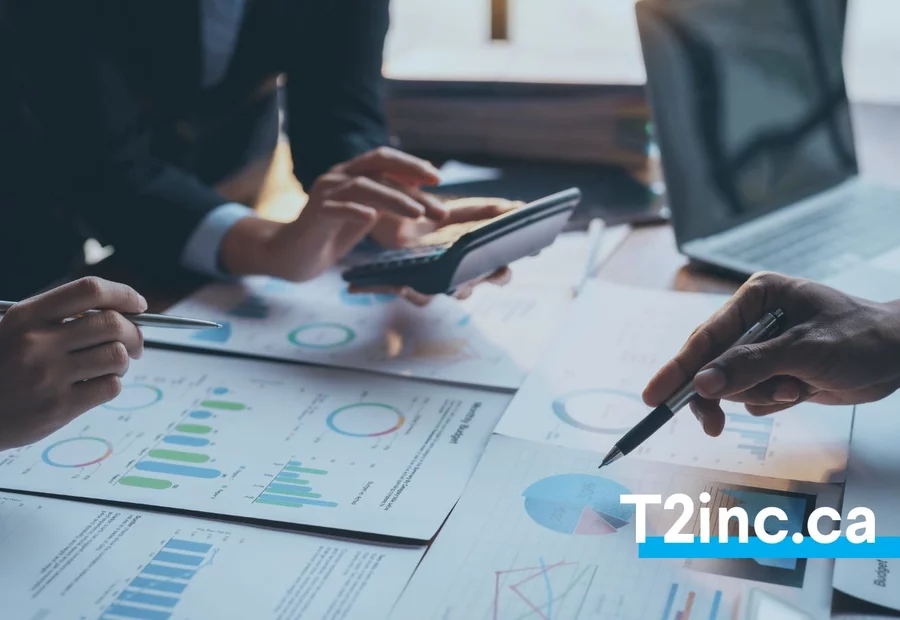Tax-Deductible Business Expenses for Small Businesses in Canada

When operating an incorporated small business, every eligible expense, when properly classified and documented, can reduce taxable income and support compliant corporate tax reporting, while also improving cash flow. In Canada, many tax-deductible business expenses allow corporations to lower their taxable income, including operating costs, salaries, startup expenses, vehicle costs, telecommunications, interest, insurance, and more.
To qualify, an expense must be incurred to earn business income, be reasonable, and be supported by proper documentation. These principles form the foundation of how business deductions are applied by the Canada Revenue Agency (CRA) and, where applicable, Revenu Québec.
In practical terms, most tax-deductible business expenses follow the same logic: business purpose, reasonableness, and proper records.This guide outlines the most common eligible business expenses, provides practical examples, highlights provincial considerations, and explains how business expenses are deducted from tax in Canada.
What Is a Tax-Deductible Business Expense for Small Businesses in Canada?
In Canada, a tax-deductible business expense is a cost incurred in the normal course of operating your corporation that reduces its taxable income, provided the expense is directly connected to earning business income and meets the criteria established by the CRA.
Generally, an expense is deductible if it meets three essential conditions:
- It is incurred for the purpose of earning business income.
- It is reasonable given the nature and size of your business.
- It is supported by invoices, receipts, or contracts generally retained for at least six years, or longer in specific circumstances.
When these conditions are met, the expense may be claimed in your T2 corporate income tax return, contributing to lower corporate taxes and more effective small business tax claims.
1. Common Tax-Deductible Business Expenses for Small Businesses in Canada
The following categories represent the core tax deductible expenses for small business corporations operating in Canada.
1.1 Rent and Occupancy Costs
Amounts paid to rent business premises are generally deductible, including:
- commercial rent
- common area or condominium fees
- routine maintenance costs
- utilities related to the premises (electricity, heating, water)
Example: Your corporation pays $1,500 per month in rent, $200 in common fees, and $1,200 annually in utilities. These amounts are deductible to the extent the space is used for business purposes, with a reasonable allocation if there is mixed use.
1.2 Salaries, Wages, and Employee Benefits
Gross salaries paid to employees are deductible business expenses, along with several employer-paid contributions:
- CPP/QPP contributions
- Employment Insurance premiums
- group insurance plans
- certain employer-sponsored retirement plans
When employees advance expenses on behalf of the company (travel, telecommunications, supplies), reimbursements must be properly documented and structured. Poor handling may affect whether the expense qualifies as deductible or taxable.
Example: You pay an employee a salary of $50,000 and incur $10,000 in payroll contributions. The full $60,000 is deductible if the employment is genuine and reasonable.
1.3 Startup and Incorporation Expenses
Costs incurred to launch a business, including incorporation, may be deductible if they relate to the period when the business begins active operations. These may include:
- legal fees for incorporation
- registration and filing fees
- initial branding and launch advertising
Certain pre-incorporation or capital-related costs may require specific tax treatment and professional review.
Example: You incur $1,000 in legal fees to incorporate and $500 in launch advertising. These amounts may qualify as deductible startup expenses.
1.4 Motor Vehicle Expenses
Expenses related to using a vehicle for business purposes may be deductible, including:
- fuel and oil
- maintenance and repairs
- insurance
- licensing and registration
- business-related parking
Only the business-use portion is deductible. Maintaining a mileage log is essential to substantiate the claim.
Some vehicle-related expenses are subject to specific tax rules. For example, the cost of acquiring a vehicle must be claimed over time under the appropriate Capital Cost Allowance (CCA) classes, taking into account applicable cost limits and the half-year rule, rather than deducted immediately. Interest on vehicle loans may also be deductible, subject to prescribed limits.
Example: Your vehicle travels 20,000 km in a year, of which 8,000 km are for business (40%). If total eligible expenses are $4,000, you may deduct $1,600.
1.5 Office Supplies and Inventory
Corporations may deduct the cost of:
- office supplies
- materials used to produce goods or services
- inventory held for resale, based on applicable accounting methods
Capital assets such as furniture or computers are not considered supplies and must be depreciated.
1.6 Telecommunications
Deductible telecommunications expenses may include:
- business phone lines and mobile plans
- internet access
- conferencing or communication services
If there is mixed personal and business use, only the business portion is deductible and must be reasonably supported.
1.7 Marketing, Advertising, and Online Presence
Marketing expenses are common small business tax write-offs in Canada, including:
- digital advertising campaigns
- Canadian media advertising
- website design and online management
- promotional materials and trade shows
Example: You spend $2,000 on an online advertising campaign targeting Canadian SMEs. The full amount is generally deductible.
1.8 Travel, Meals, and Entertainment
Business travel expenses may be deductible, including:
- airfare, train, or bus tickets
- reasonable lodging
- business meals, subject to specific limitations
In most cases, meals and entertainment expenses are deductible at 50%. This generally includes meals with clients, customers, or business partners, as well as tickets to events used for legitimate business representation purposes.
In limited situations, certain meals and entertainment expenses may be deductible at a higher rate. This can apply when the cost is recharged to a client or when the expense is treated as a taxable benefit to an employee or shareholder under CRA rules. Businesses must retain detailed receipts and clearly document the business purpose of each expense to remain compliant with CRA requirements.
Example: You attend a business conference and incur $500 in transportation, $300 in lodging, and $200 in meals. Transportation and lodging are fully deductible; meals are typically deductible at 50%.
1.9 Professional Fees
Fees paid to professionals are frequently deductible, such as:
- accounting fees for financial statements and T2 filings
- legal fees for routine contracts
- consulting fees for management, HR, or tax matters
Fees related to acquiring a capital asset must generally be added to the cost of that asset rather than deducted immediately.
For the preparation of your T2 returns and CO-17 returns if you are in Quebec, T2inc.ca offers a specialized service designed for incorporated SMEs that wish to entrust this task to professionals and simplify their tax compliance.

2. Business Use of Home Expenses
When a corporation operates partially from a shareholder's residence, home-related expenses require a clear structure and documentation. Improper treatment can result in adjustments or taxable benefits.
2.1 Utilities and Maintenance
When a portion of a residence is legitimately used for business purposes and meets CRA criteria, certain household expenses may be partially allocated to the corporation, including:
- electricity
- heating
- internet
- certain maintenance and upkeep costs
The deductible portion is generally calculated based on the percentage of the home used for business purposes, such as square footage, or another reasonable and well-documented allocation method.
Proper records must be maintained to support both the calculation method and the business use of the space.
2.2 Home Office Equipment
Equipment and materials used exclusively for business activities may also be deductible, subject to applicable tax rules. This may include:
- computers and software
- printers and scanners
- office furniture
- office supplies
Depending on the nature and cost of the item, expenses may be fully deductible in the year incurred or depreciated over time under capital cost allowance (CCA) rules.
The tax treatment can vary depending on whether the assets are owned by the corporation or the shareholder, and whether the arrangement results in a deduction or a taxable benefit. Improper classification may lead to adjustments on review. The CRA provides detailed guidance on eligible home office expenses and documentation requirements.
For this reason, consulting a tax professional is strongly recommended before claiming home office deductions in a corporate context.
2.3 Property Taxes, Mortgage Interest, and Depreciation
Some structures allow partial allocation of:
- property taxes
- mortgage interest
- depreciation
These arrangements can affect other tax considerations and should be reviewed carefully. If in doubt, consult a tax specialist to determine the optimal treatment.
Frequently Overlooked Small Business Tax Deductions in Canada
Beyond the main operating expenses, many small business tax deductions in Canada are often underused or misclassified. Identifying these less obvious tax write-offs for small businesses in Canada can help reduce your taxable income without increasing risk, provided the expenses meet CRA eligibility rules and are properly documented.
Commercial and Professional Insurance Expenses
Certain business insurance premiums are generally considered tax deductible business expenses, including:
- commercial property insurance (buildings, equipment, machinery)
- commercial general liability insurance
- certain professional liability or errors and omissions insurance
Personal life insurance premiums are not deductible in most cases, unless very specific conditions are met under the Income Tax Act.
Interest and Banking Fees
A corporation may deduct certain interest expenses and banking costs when they are directly related to business operations, such as:
- interest on business loans
- interest on operating lines of credit
- bank fees, account management fees, and payment processing fees
Specific limitations may apply, particularly for vacant land, shareholder loans, or complex financing arrangements. Maintaining accurate accounting records is essential to support these claims in case of a CRA review.
Property Taxes, Business Licences, and Professional Dues
The following expenses are often included among eligible business expenses:
- property taxes on business-use real estate
- municipal business taxes
- licences and permits required to operate your business
- dues paid to recognized professional or business associations
Membership fees for social, recreational, or dining clubs are generally not tax deductible, even if used occasionally for business networking.
Bad Debts (Uncollectible Receivables)
A receivable may qualify as a tax deductible expense if:
- The amount was previously included in the corporation's income, and
- You can reasonably demonstrate that the debt has become uncollectible
Collection costs, such as legal or agency fees, may also be deductible when properly documented.
Security and Safety Expenses
Expenses incurred to protect your business premises, assets, or employees may be deductible, including:
- surveillance and monitoring systems
- alarm systems
- certain personal protective equipment required for business operations
Tax Credits Related to Specific Business Expenses
Some business expenditures do not result in a deduction but may instead give rise to a tax credit, depending on applicable federal or provincial programs in Canada. Common examples include:
- Scientific Research and Experimental Development (SR&ED) tax credits, for qualifying R&D activities
- Charitable donation tax credits, when donations are made to registered charities and eligibility conditions are met
Tax credits follow rules that differ from standard deductions. Eligibility depends on strict criteria, and not all expenses incurred in these contexts automatically qualify.
For additional context, you may consult resources on federal tax credits available to Canadian corporations.
Non-Deductible Business Expenses Business Owners Should Avoid
To protect your business in the event of a CRA review, it is just as important to understand which expenses are not deductible.
Common non-deductible business expenses include:
- personal or purely private expenses
- everyday clothing, even if worn exclusively at work
- fines, penalties, parking tickets, or speeding tickets
- commuting costs between home and your regular place of work
- dues for golf clubs, sports clubs, or recreational memberships
- personal life insurance premiums, except in limited situations
Being able to identify these non-deductible expenses helps reduce the risk of reassessments and penalties. Some exceptions may apply in specific cases (for example, mandatory safety clothing), but these situations must be analyzed individually.
How to Determine Eligible Tax Deductions for Small Businesses
To quickly assess whether an expense may be deductible for your business, you can apply the following three-question test:
- Business purpose: Was the expense incurred to earn business income?
- Reasonableness: Is the amount reasonable given your industry, business size, and normal practices?
- Documentation: Do you have proper supporting documents, such as an invoice or receipt issued to the corporation, along with any required internal records (logbooks, contracts, explanations)?
Before deducting expenses or claiming tax write-offs, take the time to validate these three points. This approach fits naturally into a broader tax planning strategy as your corporation grows or changes.
If the answer is yes to all three questions, the expense is generally considered an eligible business expense, subject to the specific rules of the Canada Revenue Agency (and applicable provincial tax authorities). In practice, this framework fits naturally into a broader tax planning strategy, particularly as your corporation grows or undergoes significant changes such as asset acquisitions, expansion, or restructuring.
Provincial Considerations (Québec)
For corporations operating in Québec, certain deductions follow additional rules. Sales tax treatment (GST/HST versus QST), documentation standards, and specific limits on representation expenses may differ from federal rules. As a result, identical expenses can produce different tax outcomes depending on province and activity.
Supporting Small Businesses With Accurate Tax Deduction Claims
Properly identifying and classifying tax-deductible business expenses is key to reducing corporate taxes and improving cash flow. When operating an incorporated small business, accuracy matters as much as eligibility, especially for expenses related to vehicles, home-office use, and professional fees.
Because tax rules evolve and some deductions involve specific limits or structures, errors are common. This is why many incorporated SMEs choose structured support to ensure compliance while fully benefiting from available deductions.
At T2inc.ca, we support incorporated businesses across Canada with the preparation of corporate income tax returns. Our services are designed for SMEs seeking clarity, structure, and compliance when reporting their business expenses.
This content is provided for general informational purposes only and does not constitute personalized tax advice. Each situation must be assessed based on applicable legislation.
- What Is a Tax-Deductible Business Expense for Small Businesses in Canada?
- 1. Common Tax-Deductible Business Expenses for Small Businesses in Canada
- 2. Business Use of Home Expenses
- Frequently Overlooked Small Business Tax Deductions in Canada
- Non-Deductible Business Expenses Business Owners Should Avoid
- How to Determine Eligible Tax Deductions for Small Businesses
- Provincial Considerations (Québec)
- Supporting Small Businesses With Accurate Tax Deduction Claims
Contact our experts
Have a question? Need help? Fill out our online form to get help from our experts.
Contact usNeed more help?
Contact us by filling out our form
Are you interested in our services, but would like more information before taking the plunge? Contact us today and one of our tax accountants will be in touch to help you.
At T2inc.ca, we're committed to helping business owners manage their company's tax affairs so they can grow their business.




